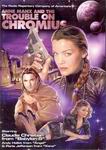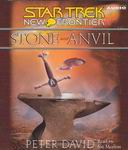
 Isaac Asimov’s All-Time Favorite Science Fiction Stories, Volume 1
Isaac Asimov’s All-Time Favorite Science Fiction Stories, Volume 1
Ed. by Martin H. Greenberg; Read by René Auberjonois
One cassette – 60 minutes [UNABRIDGED]
Publisher: Durkin Hayes Publishing Ltd.
Published: 1997 – Out Of Print
ISBN: 0886469730
Themes: / Science Fiction / Short Stories / Time Travel / Politics /
This audiobook contains two short stories:
In “Captive Market” by Philip K. Dick, an old woman gifted with precognition has previewed the futures to find one in which survivors on the radioactive Earth need supplies for their escape to a safe planet. As the proprietor of a small town country store, she has the business acuity to recognize this windfall; her canniness far outweighs any sympathy she may have for their plight. Making trip after trip into their time continuum with the supplies for which they pay in pre-war money, she selfishly refuses to tell them a vital fact she had also previewed — they will fail to escape. “Captive Market” ably demonstrates Philip K. Dick’s unique take on what is normally a by the numbers affair, the science fiction staple of time travel. He turns it on its ear to produce a great short story! “Captive Market” was first published in the magazine Worlds of If in April 1955.
Poul Anderson’s “The Last of the Deliverers”, is set a hundred years from now. Things have changed in the world, and the old rivalries between nations and ideologies are a thing of the past. But for Uncle Jim, who calls himself “a republican”, whatever that is, the old ways are the best ways. When another man, as old as Uncle Jim, showed up a great disagreement ensued after he called himself “a communist”. They both seemed to think that the fate of the community was at stake, and that if the people listen to them there would be no end of trouble. Uncle Jim insisted on something he called “capitalism”, and the communist wanted something called communism. The people all thought they were both crazy. “The Last Of The Deliverers” first appeared in The February 1958 issue of the “Magazine of Fantasy & Science Fiction”. Poul Anderson is probably just under the radar of a casual science fiction fan, but those who know his work and love it will love this one as much as I did. Anderson gives us a peek at ‘the long view’, and shows us how the passing of years makes fools of us all.
I have a strong affinity for obscure goodness, and this audiobook is a perfect example of exactly that. Durkin Hayes, the publisher, has been out of business for a few years now but even so, its strong line up of science fiction and fantasy short story collections are to be ignored only at extreme peril.
The Isaac Asimov’s Favorite Science Fiction Stories series ran to seven volumes, later a shorter but equally impressive follow-up series entitled Isaac Asimov Countdown 2000 ran for four volumes. Both series are actually made up of stories not by Asimov but by other authors, tales that Asimov though were important and interesting. Both of the stories in this, the first volume in the series, are performed extremely well by René Auberjonois, best known for his role on Star Trek: Deep Space Nine. I highly recommended this audiobook, and the whole series, unfortunately due to Durkin Hayes being out of business you may have great difficulty finding a copy of this audiobook.
 War of the Worlds
War of the Worlds Anne Manx and the Trouble on Chromius
Anne Manx and the Trouble on Chromius

 The Moon Moth
The Moon Moth Star Trek New Frontier: Stone and Anvil
Star Trek New Frontier: Stone and Anvil Doomsday Book
Doomsday Book